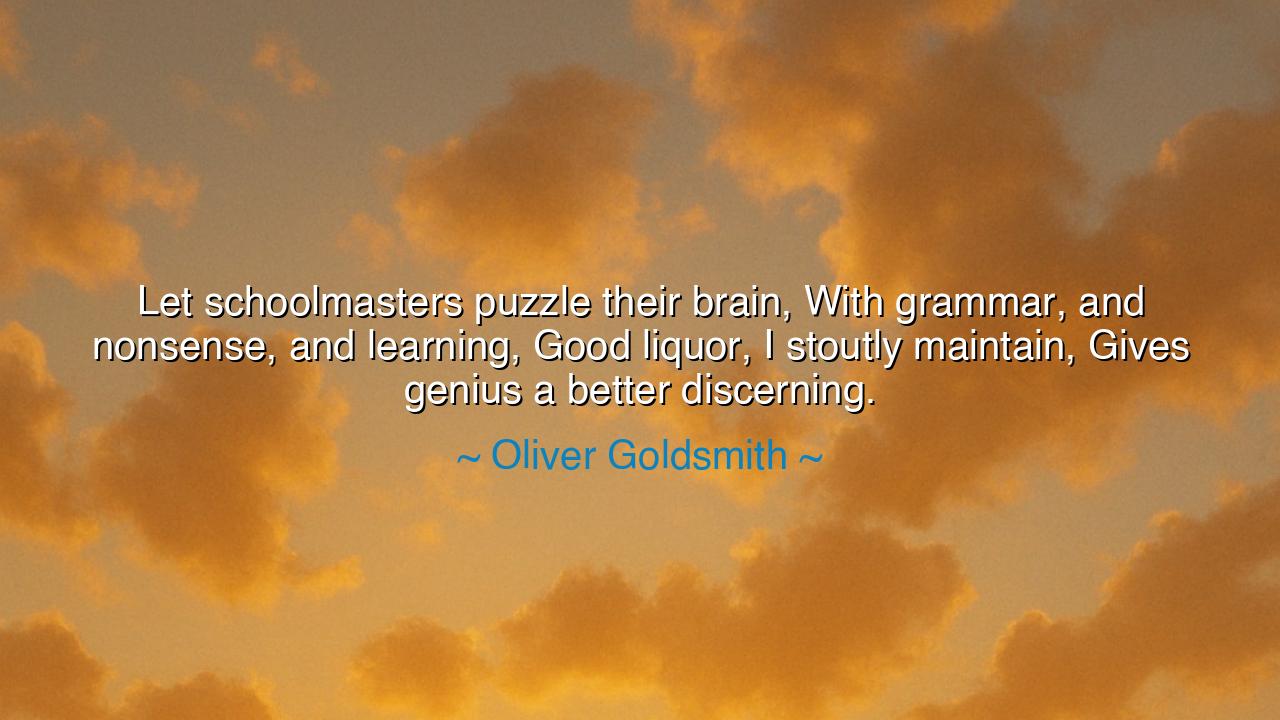
Let schoolmasters puzzle their brain, With grammar, and nonsense
Let schoolmasters puzzle their brain, With grammar, and nonsense, and learning, Good liquor, I stoutly maintain, Gives genius a better discerning.






“Let schoolmasters puzzle their brain,
With grammar, and nonsense, and learning,
Good liquor, I stoutly maintain,
Gives genius a better discerning.” – Oliver Goldsmith
In these playful yet profound lines, Oliver Goldsmith, the poet, playwright, and wit of the eighteenth century, speaks with the laughter of rebellion and the wisdom of experience. Beneath his humor lies a subtle critique of the rigid academic learning of his age — the kind that prizes rules over revelation, and memorization over imagination. He contrasts the schoolmaster, bound by grammar and form, with the genius, whose insight comes not from dusty books but from the warmth of human experience — symbolized by good liquor, that ancient drink of camaraderie and freedom. Goldsmith’s words are not merely a toast to indulgence; they are a celebration of authentic understanding, of learning that arises from living, feeling, and daring to think beyond convention.
The origin of this quote lies in Goldsmith’s own life and art. Born in Ireland, he wandered through Europe as a poor scholar, often hungry and homeless, yet rich in curiosity and spirit. He saw with his own eyes the difference between those who studied the world from the safety of libraries and those who learned it by walking its roads. To Goldsmith, true wisdom came not from grammar books, but from the human heart — from conversation, observation, and the joyous disorder of life. His satire in these lines is aimed at the pretentious scholars who mistake pedantry for wisdom, those who, in puzzling their brains over abstract rules, forget the living essence of thought and beauty.
When he says that “good liquor gives genius a better discerning,” Goldsmith does not speak merely of drink, but of liberation. The liquor here is symbolic — it is the spirit that frees the mind from fear, that loosens the tongue to speak truth, that opens the imagination to visions unseen by the sober critic. It is the same spirit that inspired poets, prophets, and dreamers across the ages — not the drunkenness of the body, but the ecstasy of the soul. In this sense, Goldsmith’s verse reminds us that genius requires freedom — freedom from rules, from fear of failure, from the heavy hand of dogma. True creativity begins where obedience ends.
History itself is filled with examples of this truth. Consider William Blake, who, like Goldsmith, scorned the narrow minds of academic teachers and sought his learning in the fires of vision. He saw angels in the trees of London and eternity in a grain of sand — yet in his lifetime, scholars dismissed him as mad. Or think of Galileo, who dared to defy the learned men of his day by gazing at the heavens with his own eyes, and in doing so, expanded the boundaries of human thought. These were not “schoolmasters,” but seekers — guided not by rote learning, but by wonder and passion. Like Goldsmith’s genius, they possessed the kind of discernment that no grammar can teach.
Yet Goldsmith’s words also carry a warning. He mocks not the pursuit of learning itself, but its misuse — when learning becomes an idol, and intellect a cage. There is a kind of education that enlightens, and another that blinds. The first teaches us to see the world as it is, with humility and curiosity; the second teaches us to see only as others have told us, with arrogance and conformity. Goldsmith urges us to remember that the mind, like wine, must breathe — that knowledge must mingle with experience, with laughter, with love, if it is to yield wisdom. Without life, learning turns stale; without joy, even genius grows weary.
In the tavern of Goldsmith’s imagination, good liquor represents communion — the breaking down of barriers between people, the sharing of stories, the meeting of minds unafraid of error or passion. The schoolmaster may lecture from his podium, but the poet learns by listening to the hearts around him. It is in such moments — when we laugh, when we speak without pretense, when we taste the fullness of life — that insight awakens. Thus, Goldsmith’s lines remind us that human connection is the highest education, and that wisdom grows best in the soil of fellowship, not isolation.
So, let this be the lesson for all who seek knowledge: learn, but live. Study the rules, but do not let them rule you. Do not let learning become a chain upon your spirit. Drink deeply — not only from the cup of study, but from the cup of life. Travel, listen, question, err, and begin again. Seek wisdom in laughter as much as in logic, in tears as much as in texts. For as Oliver Goldsmith teaches, the mind becomes sharp not by puzzles alone, but by passion, by experience, and by the courage to think freely.
And in the end, the greatest teacher is not the schoolmaster, but life itself — rich, unpredictable, intoxicating, and alive. Raise a cup, then, to the joy of learning that liberates the soul — to the wisdom born not in the classroom, but in the heart’s untamed flight.






AAdministratorAdministrator
Welcome, honored guests. Please leave a comment, we will respond soon